The Science of Learning: Why Unstructured Play Drives Brain Growth
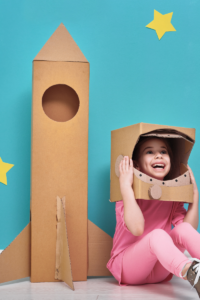
Imagine this: Your child is engrossed in a world of their own creation. Cardboard boxes transform into spaceships, a pile of blankets becomes a magical castle, and a collection of mismatched buttons turns into a pirate’s treasure. This isn’t just imaginative play – it’s the foundation for remarkable brain development. In today’s world of busy schedules and limited time, it’s easy to choose dance class or soccer practice over downtime at home, but the truth is, unstructured, or open-ended play is an important part of your child’s development.
The Science of Learning: Why Unstructured Play Drives Brain Growth
Between the ages of 2 and 7, your child’s brain undergoes a remarkable transformation. It’s a critical window of development, where new neural connections are formed at an astonishing rate. As parents, we should nurture this growth and help our children reach their full potential.
However, the best way to do this might surprise you. Forget about meticulously planned schedules, expensive learning toys, or endless lessons, classes, and structured activities. The secret weapon for unlocking your child’s potential lies in something much simpler: unstructured, open-ended play.
Unstructured Play: More Than Just Fun
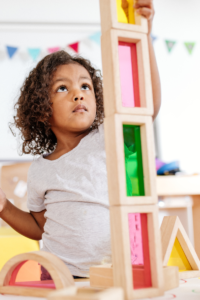
So, what exactly is unstructured play? Unlike structured activities with set rules or expected outcomes (like soccer practice, a cake recipe, or instructions for a specific craft project), unstructured play allows children to be the directors of their fun. It’s about providing open-ended materials and giving children the time and space to experiment, explore, and let their imaginations run wild.
Think about it this way: a pile of colorful blocks can morph into a towering skyscraper, a bustling city street, a zoo for keeping animals, or a new invention that will change the world. A collection of sticks and leaves becomes a magical wand, a tool for building a fairy house, or a beautiful crown. Open-ended materials like these spark creativity and allow children to explore endless possibilities, fueled by their own ideas and interests.
Unleashing the Power of Play: Brain Development in Action
While your child is learning and growing during their critical period of brain development, unstructured play is a powerful tool to nurture their developing skills. It provides a platform for exploration, imagination, and independent thinking – all key ingredients for a thriving young mind. They’ll strengthen social-emotional and other essential skills that improve academic performance. In short, by incorporating unstructured play into your child’s daily routine, you’re not just creating a fun and engaging environment – you’re actively nurturing their brain development and setting them up for future success.
Here are some of the key benefits:
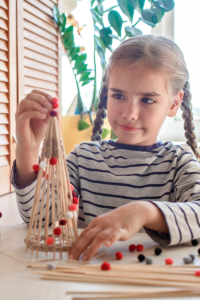
1. Fostering Creativity and Imagination:
Unstructured play provides a space for children to explore their ideas freely. Unbound by rules, they can invent stories, build elaborate scenarios, and experiment with different possibilities. This “thinking outside the box” approach not only sparks their creativity but also helps them develop critical problem-solving skills as they figure out how to make their creations come to life. Imagine your child building a tower with blocks – they’re not just stacking them, they’re figuring out balance, stability, and how to achieve their desired structure.
2. Building Emotional Intelligence:
Pretend play, a cornerstone of unstructured play, allows children to explore the world of emotions. By taking on different roles and acting out scenarios, they begin to understand and express their own feelings. This play also helps them practice social interactions and develop empathy for others. Imagine your child having a tea party with their stuffed animals. They’re not just pouring imaginary tea, they’re learning valuable life skills like taking turns, sharing, and navigating social situations – all through the power of pretend play!
3. Encouraging Independence and Confidence:
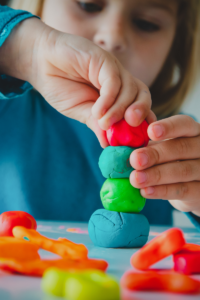
Unstructured play provides a platform for children to make their own choices. Whether it’s deciding what to build with blocks or how to act out a story, they’re in control. This sense of agency fosters a feeling of self-reliance and builds confidence in their own abilities. The joy of accomplishment after successfully building a towering block structure or putting on a “successful” puppet show is a powerful motivator for young children. It fuels their intrinsic desire to learn and explore further.
Remember, the key is to let your child take the lead and explore their creativity!
Unstructured Play in Action: Tips for Parents
Now that we’ve explored the incredible benefits of unstructured play, let’s dive into some practical tips to make it a seamless part of your child’s day:
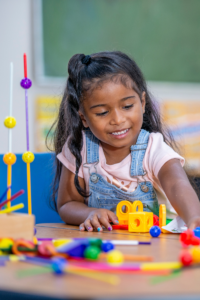
- Create a Safe Exploration Zone: Whether it’s a playground, a play mat, or a clear corner of a room, designate a space specifically for open-ended play. Ensure the space is free from hazards and allows children to express themselves freely through exploration and risk-taking. This will be their launchpad for imaginative adventures!
- Fuel Imagination with Open-Ended Materials: Fill the space with open-ended toys and materials that spark creativity and exploration, not those with predetermined outcomes. This allows children to use their creativity to develop ideas and explore their environment in endless ways.
- Empower Exploration: This might be the most crucial element – step back and observe the magic unfold! Let your child take the lead, explore their ideas, and figure things out on their own. Your role is to be a supportive cheerleader, offering encouragement and occasional guidance if needed.
- Join the Adventure (Sometimes): While unstructured play encourages independent exploration, occasionally joining in can be a wonderful bonding experience. Build a tower together, add a character to their story, or simply be present and engaged in their world. It’s about quality time and creating cherished memories.
- Spark Curiosity with Open-Ended Questions: Unstructured play is rich with learning opportunities! Ask your child open-ended questions about their creations. For example, “What happens if you put the red block on top?” or “What sound does your spaceship make?” This encourages critical thinking and language development.
- Make Time for Make-Believe: Consciously limit scheduled activities throughout the day to ensure ample time for unstructured play. This allows your child the freedom to explore their creativity and imagination without feeling rushed.
- Embrace Active Exploration (Within Your Comfort Zone): Let’s be honest, unstructured play can involve creative clutter! Instead of dreading cleanup, see it as a positive sign of active exploration and a thriving imagination. Set realistic expectations for tidying up, and involve your child in the process to teach responsibility. Remember, you can embrace this spirit of exploration within a level of mess that feels comfortable for your household.
By incorporating these tips, you’ll be well on your way to creating a nurturing environment that fosters your child’s development through the power of unstructured play!
The Power of Play
As we’ve seen, unstructured play is more than just fun and games – it’s a powerful tool for brain development in young children. By allowing them to explore their creativity, build narratives, and make their own choices during playtime, we’re nurturing their imagination, problem-solving skills, emotional intelligence, and confidence. Remember, the “messy science” of unstructured play is a recipe for a thriving young mind!
Start building a stronger connection with your child today! Download your FREE guide: THE POWER OF POSITIVE PARENTING: A FREE GUIDE TO CALMER DAYS & STRONGER BONDS.
Follow @ThatQuietMom on Instagram, and let’s create a community of parents who are passionate about nurturing the potential in our little learners, one messy masterpiece at a time!





